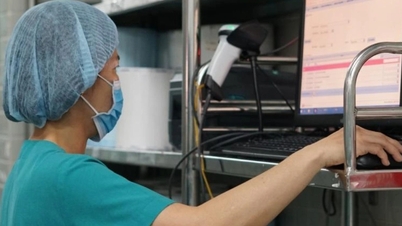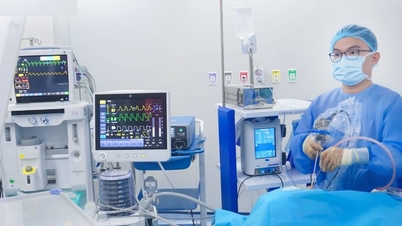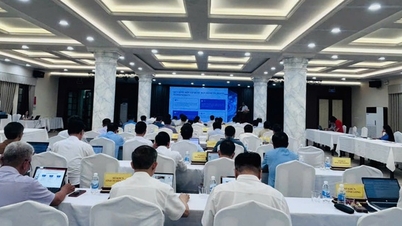After a few months, Ms. A's blood lipid index increased, chest pain and difficulty breathing appeared. During examination, the doctor discovered signs of myocardial ischemia and coronary artery stenosis.
Similarly, Ms. STA (42 years old, in Ho Chi Minh City) was prescribed Ban Ha Bach Truat Thien Ma thang to treat dizziness and nausea due to phlegm and liver wind. After looking it up with AI tools, Ms. A. found some ingredients such as licorice, ginger, and dried tangerine peel "unnecessary" so she arbitrarily removed them. As a result, the symptoms became worse because the medicine lost the "ruler-minister-assistant-envoy" balance, causing the function of dissolving phlegm and counteracting the adverse effects to be disrupted.

AI provides a lot of useful information, but there is also information that leads to misunderstandings about health conditions.
ILLUSTRATION: NHU QUYEN
Many consequences when stopping medication on your own according to… WHO!
People consulting their health status online is not a recent phenomenon, but the emergence of artificial intelligence (AI) has made this trend potentially risky and dependent on machines, especially among people who are not familiar with technology.
Accordingly, specialist doctor 2 Truong Thien Niem, Head of the Examination Department, Gia An 115 Hospital, said that arbitrarily stopping or changing medication based on information from AI can cause the disease to lose control and cause dangerous complications.
Diabetes : Stopping medications such as insulin or metformin and other drugs can cause blood sugar to spike, leading to acute complications (ketoacidosis coma) or long-term complications (kidney, eye, nerve damage). Changing the wrong dose can also make the disease harder to control, increasing the risk of cardiovascular events and kidney failure.
Cardiovascular disease : Stopping anticoagulants, lipid-lowering drugs, or heart failure medications can increase the risk of heart attack, stroke, arrhythmia, or acute heart failure. Additionally, changing medications based on general recommendations from an AI can cause dangerous drug interactions.
High blood pressure : Stopping medications such as beta-blockers, diuretics, or other antihypertensive drugs can cause a sudden increase in blood pressure; leading to stroke, kidney failure, and cardiovascular complications.
In terms of traditional medicine, Dr. Ngo Thi Kim Oanh, University of Medicine and Pharmacy Hospital, Ho Chi Minh City, branch 3, said: “Each medicinal ingredient plays a separate role in regulating yin and yang, blood and energy. Omitting or changing medicinal ingredients can break the structure of the prescription, reducing or reversing the treatment effect. AI only analyzes text data, cannot make dialectics according to specific disease conditions or sense pulse, color, and energy. The consequences can lead to metabolic disorders, liver and kidney damage, or according to traditional medicine, blood and energy disharmony, making the disease more difficult to treat.”

When dangerous signs such as chest pain, difficulty breathing, loss of consciousness appear, the patient must go to the hospital immediately.
Photo: AI
AI is useful when looking up general information
Mr. Nguyen Hoang Chi Nhan, communications team, University of Medicine and Pharmacy Hospital, Ho Chi Minh City - Campus 3, shared: “AI holds great promise for the future of medicine. In traditional medicine, researchers are currently applying AI to analyze pulse charts, tongue images, or dialectical data statistics to support diagnosis. However, no matter how advanced technology is, the human factor is still central and cannot be replaced by machines or algorithms.”
AI is only useful when used to look up general information, better understand a diagnosed disease, or consult a healthy lifestyle.
According to doctors, when dangerous signs such as chest pain, difficulty breathing, loss of consciousness, uncontrollable bleeding, high fever, etc. or uncontrolled chronic diseases (abnormally high/low blood pressure and blood sugar levels) appear, the patient must go to the hospital.
In particular, changing or stopping medication should only be done under the direct supervision of a doctor to limit unnecessary risks.
Safety limits when using AI in the medical field
Dr. Ngo Thi Kim Oanh, University of Medicine and Pharmacy Hospital, Ho Chi Minh City - Facility 3 recommends that people should clearly understand the limits when using AI in the medical field:
Use AI for general information only : Learn about herbs, health practices, or diets, but do not make inferences about drug combinations.
Never adjust your prescription yourself , do not add or remove any medicine from the prescription. Each medicine has a specific role in the overall treatment method, changing it will distort the effect, even cause side effects.
Only consult information from reliable, scientifically verified sources. Common AI applications often do not have in-depth medical data or have not been evaluated by professional bodies.
Be wary of “miracle” remedies suggested by AI or websites. If the information is unfounded or the source of the medicine is unknown, patients should consult a doctor before using it.
Source: https://thanhnien.vn/canh-bao-rui-ro-suc-khoe-khi-tu-y-bo-thuoc-vi-tin-ai-185251013152722661.htm


















































































































Comment (0)